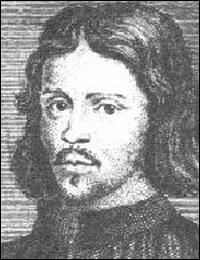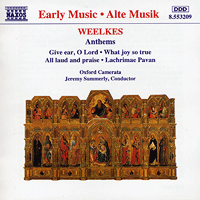In Celebration of the Human Voice - The Essential Musical Instrument
Home | Doo Wop | Barbershop | World | Contemporary | Christian | Vocal Jazz | Choral | Christmas | Instructional | Arrangements
Classical | Opera | Musicals | Personality | Young Singers | Disney | Videos | Songs | The Artists

Thomas Weelkes

Weelkes was baptised in the little village church of Elsted in Sussex on 25 October 1576. It has been suggested that his father was John Weeke, rector of Elsted, although there is no documentary evidence of the relationship. In 1597 his first volume of madrigals was published, the preface noting that he was a very young man when they were written; this helps to fix the date of his birth to somewhere in the middle of the 1570s. Early in his life he was in service at the house of the courtier Edward Darcye. At the end of 1598, at the probable age of 22, Weelkes was appointed organist at Winchester College, where he remained for two or three years, receiving the salary of 13s 4d per quarter. His remuneration included board and lodging. During his Winchester period, Weelkes composed a further two volumes of madrigals (1598, 1600). He obtained his B. Mus. Degree from New College, Oxford in 1602, and moved to Chichester to take up the position of organist and informator choristarum (instructor of the choristers) at the Cathedral at some time between October 1601 and October 1602. He was also given a lay clerkship at the Cathedral, being paid 15 2s 4d annually alongside his board, lodging and other amenities. The following year he married Elizabeth Sandham, from a wealthy local family. They had three children and it was rumored that Elizabeth was already pregnant at the time of the marriage. |
Arrangements | Recordings
Recordings and DVDs
Oxford Camerata : Weelkes: Anthems If Weelkes stands slightly apart from his contemporaries then it is because he was perhaps the nearest the English got to a 'dare-devil'. The traits of the boldest compositions of his 1600 madrigal collection dig surprisingly deeply into the baroque psyche without ever drawing on specific 'baroque' practices: impetuosity, restlessness, a love of bold and startling symbolism, concentrated gestures, and an ambition for large structural coherence - all characteristics which would have found a natural home fifty years later. But when the madrigal soon, and ironically for Weelkes, became an anachronism he willingly turned his attention to the church, committed as he was to the bastion of counterpoint. However tempting it is to think of an innovator stifled by the conservatism of his age, the relatively experimental devices in the madrigals are surprisingly unintegral to Weelkes's musical style. He was never particularly responsive to words; as Hosanna to the son of David and Alleluia! I heard a voice display, his music is essentially driven by sonorous textures and an engagingly direct desire to set a text with the minimum of fuss. Songlist: Hosanna to the son of David, Give ear, O Lord, All people clap your hands, What joy so true, O Lord, grant the king a long life, Lord, to thee I make my moan, All laud and praise, Lachrimae Pavan, A remembrance of my friend Thomas Morley, Passymeasures Pavan, Gloria in excelsis Deo, When David heard, Give the king thy judgements, O Lord, arise, O how amiable are thy dwellings, Most mighty and all-knowing Lord, Alleluia, I heard a voice |
![]() Vocal Harmony Arrangements - Home
Vocal Harmony Arrangements - Home
Christian | Gospel | Standards | Musicals | Specialty | World | Barbershop | Contemporary | Vocal Jazz | Choral | Christmas
Mixed Voices | Female | Male | 8 Parts | 6 Parts | 5 Parts | 3 Parts | 2 Parts | Medleys | Solo | Folio Series | New Releases
Select a Category |
Want to Sing? - Find a Chorus Near You
List of Choruses by State | List of Choruses by City

